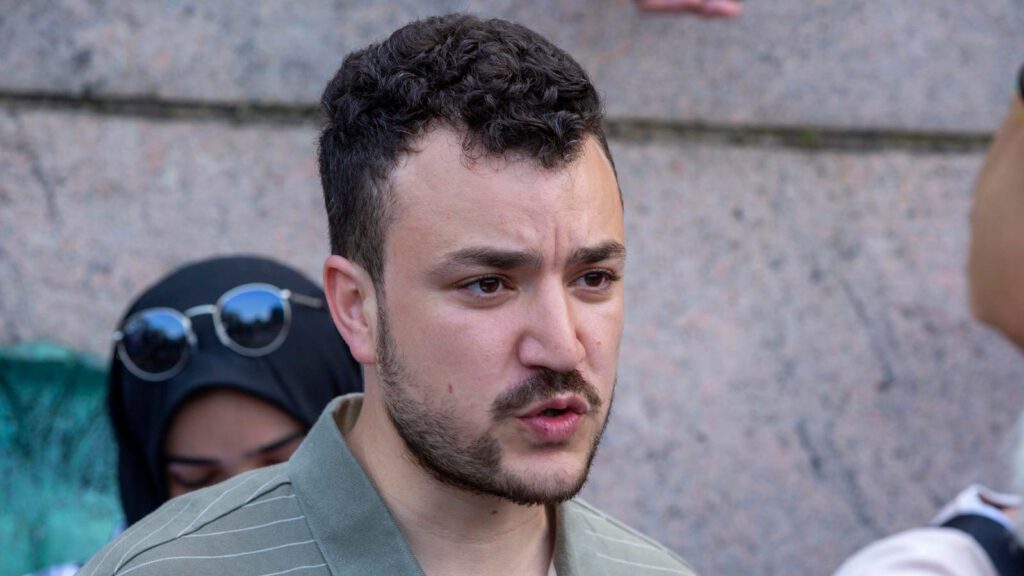Topline
Top Republican officials include House Speaker Mike Johnson, R-La., and President Donald Trump have defended the detainment of activist Mahmoud Khalil, a green card holder who helped lead Columbia University’s pro-Palestinian protests and who was arrested Saturday night, and threatened more arrests would follow as he targets the university and protests.
Student negotiator Mahmoud Khalil at a pro-Palestinian protest encampment on the Columbia University … [+]
Key Facts
Khalil, who was born in Syria to Palestinian parents, was arrested Saturday night by federal immigration agents at at his university-owned residence.
Trump confirmed Khalil’s arrest in a Truth Social post, calling the protester “a Radical Foreign Pro-Hamas Student” and saying his detainment was “the first arrest of many to come.”
Johnson also defended Khalil’s arrest in comments to reporters Tuesday, saying pro-Palestinians activists’ actions are “beyond the pale” of free speech and warning, “If you are on a student visa and you’re an aspiring young terrorist who wants to prey upon your Jewish classmates, you’re going home”—even though Khalil was on a green card, which offers more protections than a student visa.
Secretary of State Marco Rubio shared a link to coverage of Khalil’s arrest and wrote on X on Sunday, “We will be revoking the visas and/or green cards of Hamas supporters in America so they can be deported.”
Khalil’s attorneys argued in a court filing that the activist’s arrest was a “blatant [effort] to target and chill [Khalil’s] speech and to discriminate against particular viewpoints in contravention to the First Amendment” and the activist’s due process rights, according to a copy of the filing made public by Courthouse News.
His lawyers also alleged in the filing there was a “misunderstanding” over Khalil’s immigration status, writing immigration officials initially told Khalil they were arresting him because his student visa had been revoked—and, when he said he was a lawful permanent resident, “they arrested him anyway, saying that his green card had also been revoked, but providing no basis for the revocation.”
ICE agents also threatened Khalil’s pregnant wife with arrest, Greer said in a statement to NY1 Sunday—though the AP notes she is American—with the AP reporting authorities declined to tell his wife whether the activist was charged with a crime.
A federal judge Monday afternoon blocked the Trump administration from deporting Khalil while a petition challenging his arrest plays out, writing in a notice he “shall not be removed from the United States unless and until the Court orders otherwise” to preserve the court’s jurisdiction.
Columbia’s Response To Arrest Of Mahmoud Khalil
Columbia University issued a statement saying it was aware of “reports of ICE around campus” and the school’s policy is that “law enforcement must have a judicial warrant to enter non-public University areas, including University buildings”—though the school declined to tell the AP whether a warrant had been granted regarding Khalil’s arrest—and then released a second statement, adding the university is “committed to the legal rights of our students and urge all members of the community to be respectful of those rights.”
Where Is Mahmoud Khalil Being Detained?
The Immigration and Customs Enforcement’s database now shows Khalil is now being held at a detention facility in Jena, Louisiana, after previously listing him as being detained in Elizabeth, New Jersey. Before Khalil was listed as being in Louisiana, Greer said in a statement Sunday she did not know the activist’s “precise whereabouts,” noting that while they were told he was taken to a facility in Elizabeth, when his wife went to visit him they were told he was not there. Court records show Khalil’s attorneys have filed a request to have him moved back to New York.
Could More Students Be Arrested?
Comments by Trump and other top Republicans suggest that arrests of more student activists could be forthcoming. The Associated Press reported Monday the Trump administration also attempted to arrest a second Columbia University student Friday evening, but were turned away because they did not have a warrant, according to the graduate student union representing the student.
Trump Threatens Students And Schools That Support ‘pro-Terrorist’ Activities
Trump wrote on Truth Social Monday that his administration will “find, apprehend, and deport” students who engaged in “pro-terrorist, anti-Semitic, anti-American activity. He also threatened to end federal funding for any school that allows “illegal protests” (The White House has not provided clarity on what would constitute an “illegal protest”). Trump had earlier issued an executive order announcing measures to combat purported antisemitism on college campuses, which directs universities to “monitor for and report” instances of purported antisemitism among immigrant students and staff, which could “lead, as appropriate and consistent with applicable law, to investigations and, if warranted, actions to remove such aliens.” Prior to Khalil’s arrest, the Trump administration announced Friday it was revoking $400 million in federal funding for Columbia University over its purported failure to combat the pro-Palestinian protests, which critics decried for antisemitic incidents, with the Education Department citing the “continued inaction in the face of persistent harassment of Jewish students.”
Mahmoud Khalil’s Arrest Condemned By Free Speech Advocates
Khalil’s arrest has drawn widespread criticism from civil rights and free speech groups, with Jameel Jaffer, executive director of the Knight First Amendment Institute at Columbia University, calling the arrest “genuinely shocking.” “Arresting and threatening to deport students because of their participation in political protest is the kind of action one ordinarily associates with the world’s most repressive regimes,” Jaffer said in a statement, accusing the Trump administration of “run[ing]
roughshod over individual rights and the rule of law.” New York Civil Liberties Union executive director Donna Lieberman said Khalil’s arrest “reeks of McCarthyism”—referring to the 1950s-era campaign against Communism—and is a “a frightening escalation of Trump’s crackdown on pro-Palestine speech, and an aggressive abuse of immigration law.”
Can The Trump Administration Deport Green Card Holders?
Federal immigration law allows the government to revoke a permanent resident’s green card and immigration status if they’ve been convicted of certain crimes or if someone “engages in terrorist activity,” though there is no evidence of Khalil doing anything beyond protesting. In a statement on Khalil’s arrest to The Columbia Spectator, DHS also cited Trump’s executive order decrying purported antisemitism on college campuses, though the legality of that order has not yet been tested in court. Immigration law experts have criticized the Trump administration’s handling of Khalil’s detention and claims it’s revoking the protester’s green card, which federal law states the government cannot do in most cases without due process. Aaron Reichlin-Melnick, a senior fellow at the American Immigration Council, noted on Bluesky that in order to revoke someone’s green card, the government has to prove in court that the person has violated a specific provision of the law. The State Department also cannot revoke someone’s green card, Reichlin-Melnick noted—as Rubio’s post suggests—except under a narrow exception that allows the Secretary of State to personally order someone to be deported, if they tell Congress that the person “compromise[s] a compelling United States foreign policy interest.” The Trump administration reportedly arrested Khalil under that exception, according to The New York Times and CNN. That still would not grant the government the right to immediately deport the person without due process, however, Reichlin-Melnick noted. That point was previously underlined by Trump’s sister, former Judge Maryanne Trump Barry, who wrote in a 1996 ruling about the issue of whether legal immigrants can “be forcibly removed … in the unfettered discretion of the Secretary of State and without any meaningful opportunity to be heard”: “The answer is a ringing ‘no.’”
Far-Right Figures Oppose Mahmoud Khalil’s Arrest
Some figures on the far-right who typically support Trump have expressed criticism of the administration’s arrest of Khalil, and practice of arresting pro-Palestinian protesters more broadly. Responding to a post claiming people are creating a “list” of foreign students for the administration to potentially deport, right commentator Ann Coulter said on X Monday, “There’s almost no one I don’t want to deport, but, unless they’ve committed a crime, isn’t this a violation of the first amendment?” She later posted a follow up post specifying her post “make[s] no mention of any specific protester whatsoever.” Conservative commentator Candace Owens also objected to Khalil’s arrest, asking what “specific statement” he made in support of terrorist group Hamas that justified his arrest and writing, “Mahmoud Khalil was a permanent US resident with no arrest record and an American wife that is 8 months pregnant. This requires further explanation.” “I will never cheerlead for things that are meant to chill speech—ever,” Owens added.
Anti-Defamation League Praises Trump’s Arrest Of Mahmoud Khalil
The Anti-Defamation League, a civil rights organization dedicated to combating antisemitism, issued a statement late Sunday strongly supporting the Trump administration for arresting Khalil. “We appreciate the Trump Administration’s broad, bold set of efforts to counter campus antisemitism — and this action further illustrates that resolve by holding alleged perpetrators responsible for their actions,” the organization wrote on X.
What Has Columbia Accused Mahmoud Khalil Of?
Prior to his arrest, Khalil was reportedly one of several students that Columbia was investigating internally over their role in the pro-Palestinian protests, the AP reported last week. Khalil told the AP that the school had levied approximately 13 allegations against him, which he claimed were primarily for “social media posts that I had nothing to do with.” Khalil said Columbia had also threatened to block his transcript and stop him from graduating after he refused to sign a non-disclosure agreement, before his attorney appealed the decision. Columbia “just want[s] to show Congress and right-wing politicians that they’re doing something, regardless of the stakes for students,” Khalil told the AP, describing the investigations as efforts “to chill pro-Palestine speech.”
What To Watch For
Unrest may be rising again at Columbia over how the school is responding to its pro-Palestinian activists. The AP reported in late February that protesters demanding “amnesty” for those disciplined for pro-Palestinian protests had forced their way into a building at Barnard College—an all-female liberal arts college within Columbia—and allegedly assaulted a school employee. Student-led group Columbia Students for Justice in Palestine said on X that public safety officials had “HARASSED AND SHOVED SEVERAL STUDENTS, KNOCKING AT LEAST ONE TO THE GROUND.” “WE WILL NOT STOP UNTIL OUR DEMANDS ARE MET,” the student group posted on Feb. 26, announcing a series of demonstrations and other protest actions at the school in the weeks since.
Key Background
Columbia was the epicenter of the pro-Palestinian protests that took place on college campuses last year, leading to a widely publicized clash between university leadership and activists. Student activists occupied university buildings and created a tent encampment on the school’s campus that resulted in action from the New York Police Department and Columbia suspending students who refused to disburse. Columbia president Minouche Shafik later resigned from her position in August—one of several university leaders who stepped down amid the protests—saying her tenure had been “a period of turmoil where it has been difficult to overcome divergent views across our community.” Republicans have harshly criticized the protests as fueling antisemitism on college campuses, and a Columbia University task force said in an August report that Jewish students at the school had felt “ostracized” on the school’s campus amid the demonstrations and felt their concerns were being ignored by school officials. In addition to the action by the Trump administration, the Republican-led House Education Committee sent a letter in February to Columbia’s president and trustees chastising the school for its alleged “failure to address the pervasive antisemitism that persists on campus” and demanding documents related to the protests.
Further Reading

